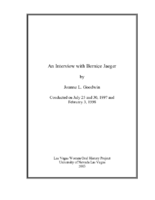Search the Special Collections and Archives Portal
Search Results

Transcript of interview with Harry Kogan by Barbara Tabach, January 12, 2016
Date
Archival Collection
Description
With a liveliness of a man decades younger, Harry Kogan looks at his 100th birthday with cheer and satisfaction. Born March 11, 1916 to poor Russian immigrant parents in the Jewish ghetto of Philadelphia, Harry vividly recalls walking to school shoeless, with no hat or no raincoat. A treat would be his mother handing him ten-cents to go to the theater and enjoy a silent movie. After graduating from high school in 1933, Harry quickly took one of the rare jobs available in a garment manufacturing company where he worked his way into being a skilled and valued fabric cutter-a job that paid $35 a week. Harry was raised with two brothers and lived in Philadelphia for the first 91 years of his life before moving to Las Vegas. One of his brothers learned the refrigeration business while enlisted in the Navy and after the war formed a commercial refrigeration business named Kogan Brothers. Harry is a philosophical and philanthropic man. He was slow to retire and traveled the world, took classes and donated to his favorite causes; among which are the Boys Town Jerusalem and the Jewish Federation of Las Vegas. He sat for this interview to honor his Jewish roots, to share his life experiences and spending the past years in Las Vegas.
Text

Transcript of interview with Bernice Jaeger by Joanne L. Goodwin on July 25, 1997, July 30, 1997, & February 3, 1998
Date
Archival Collection
Description
Interviewed by Joanne L. Goodwin. Bernice Smith was born in Cincinnati, Ohio, on July 27, 1934. She married Ivan Jaeger in 1955. He and his family were involved in the underground gaming industry in the Midwest. When it shut down in 1961, they moved to Las Vegas where Ivan worked first as a dealer and later in various executive gaming positions. Bernice was one of the fist students to attend Clark County Community College (later Community College of Southern Nevada) when it was founded in 1971. She earned a liberal arts degree in 1973 and a degree in hotel administration in 1974. Bernice worked as the secretary of Inez Rambeau, the director of convention sales at the Riviera Hotel and Casino. After a few years, she became the assistant of the hotel director at the Riviera. Later Bernice was the personal secretary to the owner and general manager of the Aladdin Hotel and Casino. She left that position in 1984, completed a bachelor's degree in the field of women's studies, and started Flex-Time, a temporary employment agency catering to working women. Then she was hired by Ira levy, the new owner of the Continental Hotel and Casino to be his assistant general manager. In 2003 Bernice earned a master's degree in counseling at the University of Nevada, Las Vegas, and she now works for Legal Rehabilitation Services, leading court-mandated group counseling for people in domestic violence situations
Text

Transcript of interview with Florence McClure by Joanne Goodwin, January 24, 1996 & February 6, 1996
Date
Archival Collection
Description
Florence McClure came to Las Vegas later in her life, but the state felt her presence and the community her contributions as if she were a native daughter. Introduced to the League of Women Voters in 1967, McClure met her political mentor Jean Ford and learned how to practice the core elements of democracy. She put those tools to work in a number of ways, however her participation in the creation of the Rape Crises Center and her advocacy for locating the women’s prison near Las Vegas are two of her long-lasting efforts. Florence Alberta Schilling was born in southern Illinois where she enjoyed the security of a tight-knit family and the independence to test her abilities growing up. She graduated from high school and attended the MacMurray College for Women at Jacksonville. With the attack on Pearl Harbor in 1941, she began a series of jobs working for the war effort. She moved to Ypsilanti, Michigan with a girlfriend to work at the Willow Run Army Airbase and then moved to Miami, Florida where she worked for the Provost Marshall in the Security and Intelligence Division. She met her husband, James McClure, at the time and they married in 1945. During the next several years, they raised a family and moved around the country and to Japan with the military. McClure came to Las Vegas in 1966 as part of her work in the hotel industry which she engaged in after her husband’s retirement from the military. She had worked in California and Miami Beach, but it was Burton Cohen in Los Angeles who invited her to join him in a move to Las Vegas to build the new Frontier Hotel and Casino. Following the completion of the Frontier, she moved to the Desert Inn with Cohen in 1967 and worked as the executive office manager. After a few years, she decided to leave the industry and complete her college education. She graduated from UNLV in 1971with a BA in Sociology with an emphasis on criminology. She was 50 years old. McClure had been a member of the League of Women Voters for a few years at that point and had learned the political process from Jean Ford and workshops on lobbying. She had numerous skills that were waiting to be tapped when she attended an informational meeting on the incidence of rape in the Las Vegas valley. From that meeting, a small group of individuals, including McClure, began the organization Community Action Against Rape (later renamed the Rape Crisis Center) in 1973. It was the first agency in the area devoted to serving individuals who had been assaulted and changing the laws on rape. The organization’s first office was set up in McClure’s home. Over the next decade, she worked to change attitudes and reshape policy by constantly raising the issues of sexual assault with police officers, emergency room doctors, judges, and legislators. Her role as an advocate took her into hospital emergency rooms and courtrooms to assist victims. It also took her to the state legislator to lobby repeatedly for a change in laws. During this period, journalist Jan Seagrave gave McClure the nickname “Hurricane Florence” - a fitting moniker that captured the force with which McClure attacked the issue. As a result of her efforts and those of the people with whom she worked, we now 1) recognize rape as a crime of assault; 2) forbid the sexual history of a rape victim from being used against her in court; and 3) recognize marital rape. In addition to learning about Florence McClure’s activities, the reader of this interview will gain information on the role of civic organizations like the League of Women Voters in engaging the voluntary efforts of women in the post-war years.
Text

Transcript of interview with Hazel Hedges by Irene Rostine, October 29, 1997
Date
Archival Collection
Description
Interviewed by Irene Rostine. Hazel Hedges moved from Kansas City to Las Vegas with her husband and son in 1952. She worked briefly as a waitress in the dining room at the Thunderbird and then became a stay at home mom until her son was in junior high. Then after she went to real estate school, she went to work in commercial real estate at Bond Realty. After that, she passed her brokers exam and transferred to Parkway Realty where she sold land. Her primary success in real estate came from selling houses and investing in land and residential properties personally. After leaving Parkway Realty, Hazel went to work for the real estate office Deshoor, Fair, and Davis, which she eventually bought and renamed Southside Realty. Eventually her son joined her, and they operated Hedges and Wade Realty with two offices, one on each side of town. Hazel also did volunteer work including the Assistance League Las Vegas' Operation School Bell Program, which provides clothing for area school children in need.
Text

Transcript of interview with Joanne Pattiani Molen by Irene Rostine, January 25, 1997
Date
Archival Collection
Description
Interviewed by Irene Rostine. In July of 1955, Joanne Molen's husband was offered a job at Nellis Air Force Base, so they moved from Alturas, California, to Las Vegas. Joanne had worked for Citizens Utilities in Alturas as a Western Union teletype operator, so she got a job with the Southern Nevada Telephone Company. She was the only woman to hold some of the positions she held. She worked for the telephone company, which became Sprint, for more than forty years, ending up as a main engineer. Joanne also was a volunteer and was active in community organizations including the American Ex-Prisoners of War and the Disabled American Veterans organizations, which lead to her being appointed by Governor Richard Bryan to the state of Nevada's Veterans Advisory Commission where she became the first woman to hold the position of chairman for the Commission. She was also voted Women of the Year four times by the local chapter of the American Business Women's Association for her work with veterans.
Text

Transcript of interview with Dr. Harrie Fox Hess by Scot Siegel, February 26, 1979
Date
Archival Collection
Description
On February 26th, 1979, Scot Siegel interviewed his psychology professor, Dr. Harrie Hess (born March 1, 1929 in Hammond, Indiana) in his office at the University of Nevada, Las Vegas. Dr. Hess discusses his family’s reason for moving to Nevada and how he felt as a young adult moving to Las Vegas. The two go on to talk about Dr. Hess’ contributions to Nevada through his work as a psychologist, and briefly mentions the first law to be drafted on psychology certification in Nevada. Dr. Hess then describes the Wild Cat Lair as an important site of social recreation for early Las Vegas youth. The interview concludes with his memory of Boulder (Hoover) Dam and how he believes that workers from the Great Depression paved the way for industrial success in gambling due to their employment on the Dam.
Text

Transcript of interview with Dan Hill by John Bennett, March 1, 1979
Date
Archival Collection
Description
On March 1, 1979, John L. Bennett interviewed Dan Hill (born May 20, 1914 in Illinois) in his home at 2130 Walnut Road, Las Vegas, Nevada, about his memory of Southern Nevada. In addition to the collector and informant, there is an unidentified woman present during the interview. Hill explains that he originally came to Nevada in search of work. He briefly moved to Europe during the First World War where he served in the Army; at the end of the war, Hill returns to Las Vegas to work at the Nevada Test Site. Hill then goes in-depth about his experience as a worker at the Nevada Test Site and different mining sites that he had also worked at. The two briefly discuss the different sheriffs that had been in charge of Las Vegas, and how many people came to Las Vegas to work at the Henderson Magnesium Plant and Hoover Dam in addition to the Nevada Test Site.
Text

Transcript of interview with Velma Holland by Beatrice Scheid, April 6, 1976
Date
Archival Collection
Description
On April 6, 1976, collector Beatrice Scheid interviewed housewife Velma Holland (born October 17th, 1903 in New Market, Iowa) in her home in Boulder City, Nevada. This interview covers her early life in Boulder City. Mrs. Holland, Connie Degennes, and Beatrice Scheid are present during the interview.
Text

Transcript of interview with Neil Henry Holmes by James Greene, January 14, 1975
Date
Archival Collection
Description
On January 14, 1975, collector James Greene interviewed foreman, Neil H. Holmes (born on November 16th, 1897, in Chicopee, Kansas) in his home in Boulder City, Nevada. This interview covers the early days in Boulder City. Mr. Holmes also discusses the local education system, family life, employment opportunities, housing, and the building of Hoover Dam.
Text

Barry Holt interview, February 11, 1977: transcript
Date
Archival Collection
Description
On February 11, 1977, collector Lee LaVecchia interviewed Barry V. Holt (born January 20th, 1946 in Las Vegas, Nevada) at his home in Las Vegas, Nevada. In the interview, Mr. Holt speaks about the differences between growing up in Las Vegas in the fifties and sixties compared to how his children are growing up at the time of the interview. He also discusses education and the religious community in the city.
Text
